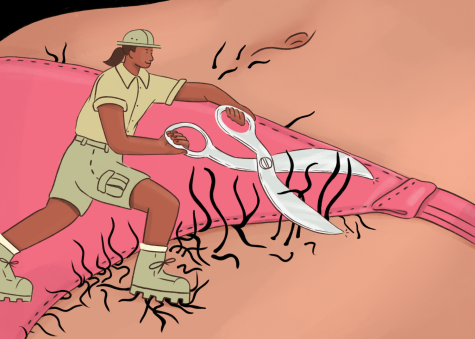Awkward: Are you obligated to get rid of pubic hair during swimsuit season?
May 13, 2021

You were so excited to get back to the beach after a year inside. You and your friends had all just gotten vaccinated for COVID-19, and you decided a small group trip to a cottage at the Indiana Dunes National Park was in order.
A weekend in your swimsuit was just what you needed, you thought. But as you and your friends dashed down to the beach on that first day, you remembered something you hadn’t had to deal with in a while: the stigmas of swimsuit season.
You hadn’t shaved, waxed or trimmed your pubic hair in the past year, but it didn’t matter because no one was there to judge you for it. After all, if a bush grows in a forest and no one is around to see it, did it ever really happen?
But now you notice your friends all have smooth legs and hairless bikini lines, and you have a bird’s nest growing out of your labia majora. Do you need to run to the store and buy a razor right now?
Are you required to get rid of your pubic hair, or are you feeling this way because of societal stigmas? The Chronicle spoke with mental health, vaginal health and sex experts to find out.
“At the end of the day, it’s [your] choice,” said Catalina Lawsin, Ph.D., a clinical health psychologist specializing in sex and relationships at her private practice. “If you’re noticing or feeling yourself pressured by it, ask yourself, ‘What do I actually want?’”
She said what is “normal” for pubic hair is determined by societal styles. Where a “big bush used to be bold and beautiful,” a full Brazilian later became popularized, and now a landing strip is in.
Jennifer Litner, sexologist and founder of Embrace Sexual Wellness, said the messages we receive surrounding body hair are part of the issue. If all we see are swimsuit models without hair around the edges of their swim bottoms, those images are sending the message that hair should not be there.
“There are some really rigid expectations that folks have had based on the messages and sexual scripts that are out there pertaining to bodies and body hair,” she said. “Body hair is a natural part of the human experience during puberty and beyond. … It’s like what kind of clothes they want to wear. It’s up to them. It’s an individual experience. There’s nothing that’s right; there’s nothing that’s wrong.”
Dr. Josh Croland, private practice OB-GYN in Peoria, Illinois, said key pieces of advice for people to remember, if they choose to remove pubic hair with a razor, are to use shaving cream and to use disposable razors no more than one time.
Croland said he has had patients use disposable razors with shower water instead of shaving cream, and they have nicked hair follicles, which has led to infections.
In general, Croland said he has seen no scientific evidence that there is a medical reason to shave, and although some people say having pubic hair creates a natural barrier from infections, there is not a lot of scientific data on that either.
Lawsin said the stigma surrounding pubic hair is patriarchal, and people with vaginal pubic hair especially have been socialized to accept negative comments and jokes, so it is up to individuals to break down this system and empower others to do whatever they want with their bodies.
“For some people [getting rid of pubic hair] makes them feel great in their bodies, and they love it, and for other people, they absolutely could go without it,” Litner said. “But it’s not something that anybody is obligated to do.”






